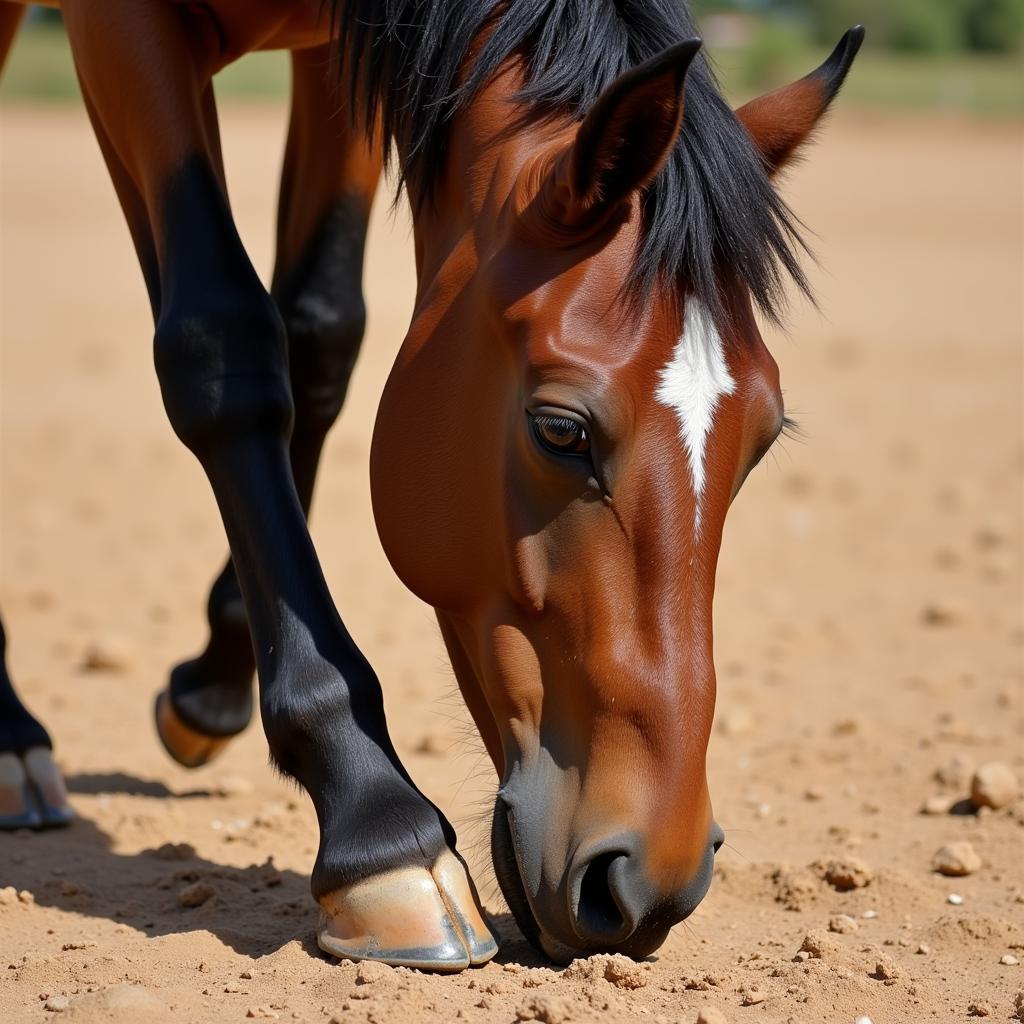A Fidget Horse can be a challenge, but understanding why they fidget is key to addressing the behavior. Whether it’s due to discomfort, boredom, or excess energy, this article will explore the common causes of fidgeting in horses and offer solutions for a calmer, more focused equine partner. We’ll delve into management strategies, training techniques, and equipment adjustments to help you and your fidget horse find harmony.
 A horse pawing the ground impatiently.
A horse pawing the ground impatiently.
Why is My Horse So Fidgety?
Horses fidget for a variety of reasons. Pinpointing the cause is the first step towards a solution. Is your horse fidgeting during training, while being groomed, or in the stall? The context can offer valuable clues. Common causes include:
- Discomfort: An ill-fitting saddle, padded horse halter, or bit can make a horse restless. Check for signs of rubbing or pressure points. A horse chewing on bit can also indicate discomfort.
- Boredom: Horses are intelligent animals and need mental stimulation. A lack of turnout, social interaction, or engaging activities can lead to fidgeting.
- Excess Energy: High-spirited horses, especially those with limited exercise, may fidget as an outlet for pent-up energy.
- Anxiety or Stress: Changes in routine, new environments, or separation from herd mates can cause anxiety and fidgeting.
- Medical Conditions: Certain medical conditions can contribute to restlessness. If your horse’s fidgeting is sudden or accompanied by other symptoms, consult a veterinarian.
Managing the Fidget Horse
Once you’ve identified the potential cause of your horse’s fidgeting, you can implement appropriate management strategies. Here are some practical tips:
- Ensure Proper Fit: Check your tack, especially the saddle and bridle. An improperly fitted padded horse halter can also cause discomfort. Ensure your horse is comfortable in all its equipment.
- Provide Adequate Exercise: Make sure your horse gets enough exercise to burn off excess energy. This can include turnout, riding, or other activities.
- Enrichment Activities: Offer toys, puzzles, and opportunities for social interaction to alleviate boredom. Even something as simple as a hay net can keep a horse occupied.
- Consistent Routine: Horses thrive on routine. A predictable schedule for feeding, turnout, and training can reduce anxiety and promote calmness.
Training Techniques for the Fidget Horse
Training can play a crucial role in helping a fidget horse learn to focus and relax. Here are a few effective techniques:
- Groundwork Exercises: Groundwork helps establish clear communication and build trust. Exercises like lunging and leading can help a fidget horse learn to control its movements.
- Desensitization: Gradually expose your horse to the stimuli that trigger fidgeting, helping them become less reactive over time.
- Positive Reinforcement: Reward calm behavior with praise, scratches, or treats. This encourages the horse to repeat the desired behavior.
- Patience and Consistency: Working with a fidget horse requires patience and consistency. Don’t get discouraged if progress is slow.
When to Seek Professional Help
If your horse’s fidgeting is excessive, persistent, or accompanied by other behavioral issues, consider consulting a professional trainer or veterinarian. They can provide expert guidance and develop a tailored plan to address your horse’s specific needs.
Conclusion
Dealing with a fidget horse can be frustrating, but understanding the underlying causes and implementing appropriate management and training techniques can make a significant difference. By addressing the horse’s needs and creating a positive learning environment, you can help your fidgety friend become a calmer, more focused partner. Remember, patience and consistency are key to success. If you are unsure how to measure your horse for a blanket, a properly fitting blanket can contribute to a horse’s comfort and reduce fidgeting. Similarly, knowing how do you measure a horse for blanket size is essential for ensuring a proper fit. A horse height stick can be helpful for accurate measurements. Addressing the horse’s needs and creating a positive learning environment, you can help your fidgety friend become a calmer, more focused partner.
FAQ
- What are the most common reasons for a fidget horse? Discomfort, boredom, excess energy, anxiety, and medical conditions can all contribute to fidgeting.
- How can I tell if my horse’s tack is causing discomfort? Look for signs of rubbing, pressure points, and changes in behavior.
- What are some effective enrichment activities for horses? Toys, puzzles, social interaction, and even a simple hay net can help.
- How can training help a fidget horse? Groundwork, desensitization, and positive reinforcement can teach a fidget horse to focus and relax.
- When should I seek professional help for my fidget horse? If the fidgeting is excessive, persistent, or accompanied by other behavioral issues, consult a trainer or veterinarian.
- Can a fidgety horse be trained to be calmer? Absolutely. With patience, consistency, and appropriate training techniques, fidgety horses can learn to relax and focus.
- What are some signs of anxiety in horses? Pawing, weaving, pacing, and excessive sweating can indicate anxiety.
When you need assistance, please contact Phone Number: 0772127271, Email: [email protected] Or visit: QGM2+WX2, Vị Trung, Vị Thuỷ, Hậu Giang, Việt Nam. We have a 24/7 customer service team.